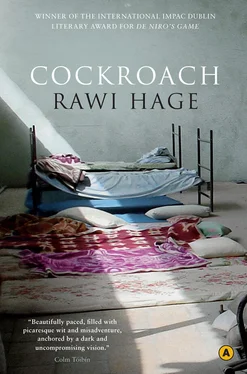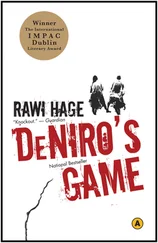When they arrived, Abou-Roro and Naim led the boy into the house and locked him in a room, and waited for phone calls from Jurdak. There was food and alcohol in the house. Any escape attempt by the boy and they were to shoot him and throw him in the sea. But looking at the kid, both Abou-Roro and Naim knew that they would never do that. The boy had soft, white skin (his mother was Scandinavian), and he had blue eyes and blond hair, and he was very good-looking — kind of frail and soft-spoken. He never once resisted, never complained. Even when his head got banged on the car window and then the door to the house, he never said a thing. Abou-Roro held his hands and guided him everywhere. He would push the boy gently and call him “Beauty.” Lower your head, Beauty; lift your head, Beauty; eat, Beauty. Go check on the beauty, he would say to Naim.
One night when Naim went to use the bathroom, he saw Abou-Roro sitting on a chair facing the boy, smoking, with a glass of whisky in his hand and his eyes fixated on the boy’s blindfold. Abou-Roro had fallen in love with the boy. He would drink whisky and gaze at the boy for hours. Finally he undid the boy’s blindfold, and with a gun in his hand, a cigarette on his lips, whisky in his palm, and the sea at his back, he would look at the boy all night and weep, not knowing what to do, or what to say to him, or how to approach him. But then, one day, Abou-Roro started to cough. The boy in his soft voice said: You should have some tea. I can make you tea.
Hearing the boy’s words, Abou-Roro wept again, approached the bed, kissed the boy on the cheek, and released his bonds. He freed the boy’s hands and unzipped the boy’s pants.
Abou-Roro closed the bedroom door, and he made love to the boy on foreign sheets through a haze of smoke. And then, next thing you know, the boy was riding beside Abou-Roro as they drove along the village streets. They were buying food together, and walking the beaches.
What will I do if Jurdak gives me the order to kill you? Abou-Roro asked the boy one night. What will I do? I can’t do it, and if I don’t, Jurdak will find us and kill us both.
Finally the boy’s father negotiated with Jurdak and paid some of the ransom.
The next morning the phone rang and Abou-Roro picked it up. He said yes a few times, and alright, and then he looked at Naim, nodded at the phone, and hung up. He walked towards Naim and told him that the chief, Jurdak, wanted Naim to leave because someone else was coming to take Naim’s place.
But why? Naim asked.
The chief said so. I told you.
When did he say that? Naim asked.
Just now, on the phone, Abou-Roro replied.
Okay, but I will wait until the replacement comes, Naim said.
No, you have to leave now. It’s the chief’s order. He wants one of his own men to stay here.
When should I be back? Naim asked.
Never.
What?
You are not to come back, said Abou-Roro. He took some money and gave it to Naim. You will get the rest of your share later, he said. Your role in this is over.
I will get my full share, right? asked hungry Naim.
Yes, you will get it all when the operation is done. The father is paying the ransom. Now, start walking.
Naim left that day.
Here I paused in my story.
Is that it? Genevieve said.
No. But do we have time left?
Yes, yes, go on.
Well, Naim left, but he climbed a nearby hill and watched the house. Soon a car came and parked in front of the house. It was full of Jurdak’s men, come to pick up the boy. Abou-Roro shot the first man who knocked at the door. He shut the door, ran back to the bedroom, and pushed the boy under the bed, closed all the curtains, and then opened the door again, stepping outside and emptying his gun, shooting with tears in his eyes. Jurdak’s men fired back and killed Abou-Roro. And the boy was freed. Abou-Roro was killed because he was in love with the boy’s blue eyes, because he wanted to keep the boy and didn’t want to hand him over to Jurdak and his men.
And Naim, no one knew about him? Genevieve asked.
No one knew of his involvement except the boy and Abou-Roro, and the boy never told. I saw Naim before I left my country. He told me the story of Abou-Roro’s death.
Genevieve sighed. Then she asked: What is your mother’s name?
My mother’s name? I asked, surprised. You have it — it is in your file.
Well, yes, but I wanted to hear how it is pronounced.
Manduza.
Do you call Manduza now and then?
She is dead.
Genevieve was silent for a minute. Then she asked, How?
She got sick.
When?
Lately.
You were here, in Canada?
Yes.
Tell me more.
I got a phone call.
From who?
My sister.
The one with the baby.
Yes.
Was she crying?
Of course.
What did you say?
Nothing.
Did you cry?
No, I did not.
Do you ever cry?
I can’t remember crying. But I must have when I was born and was pulled out of Manduza’s thighs.
Do you ever feel sad for other people?
I did not answer this. I did not know what to say. I thought we had gone past this level of intimacy. I noticed that the flowers I had brought Genevieve were dead already, dried out in the blue vase behind her.
What is your sister doing now? Genevieve asked finally.
She works at a store.
Where?
Back home.
What kind of store?
A clothing store. She sells clothes.
And where is Tony?
He left for Brazil.
So you did not manage to kill him?
No.
How did your sister get the job?
It is a long story.
Tell me. I love long stories.
If you insist, doctor.
Genevieve.
Yes, Genevieve. You see, Genevieve, Tony came by my parents’ house one Sunday when my father was away. It was summer, and all the neighbours were on their balconies. From our balcony I saw him park his car on the street. We all stood up, and my sister rushed to change her clothes. Tony was all dressed up, sober, and shaven. I ran to my room and got my gun. Then I walked through the living room and met him at the stairs. I let my gun hang low. I asked him where he thought he was going, but he did not answer and kept on marching up the stairs. By this time my sister and my mother had followed me to the door. Before he could cross the threshold, I extended my arm with the gun and put it in front of his face.
Go out of the way, kid, he said.
When the women saw the gun, they screamed, and their screams pealed off the walls and the old wooden doors and brought out the neighbours from down and up the stairs. They watched me curse the bastard, telling him that he couldn’t just come and take what he wanted and disgrace our house’s honour. He ignored me and told my sister to bring the kid and the suitcase and come back home. My sister was hysterical.
I cranked the gun and took a shot above Tony’s head, and all the women in the building shrieked and grabbed their children and ran. The sound of the shot echoed loudly, but Tony did not even blink. The men in the building told me to calm down, to put down the gun. And Tony backed off and said that I would regret what I had done. Then he left.
Joseph Khoury, an older man who had never married and who lived on the top floor, came down and talked to me. He said, This is not the right way to deal with things. Look what you are doing to your mother and sister, look at the children and women around you. They are all scared. Even if you are at war, you should have decency. These days, you young kids think you can do what you please.
And then, seeing that he was having an effect on me, my mother invited Joseph Khoury for a coffee. As the man entered our house, my sister came out of her room in tears. She came out and shouted, Shoot me! Here, shoot everyone! Shoot my baby as well! And she slapped my face.
Читать дальше












